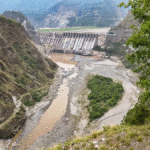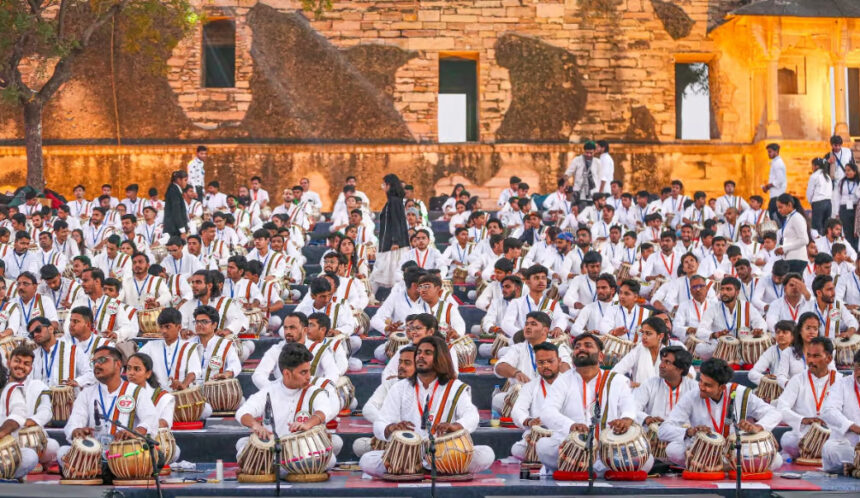In the heart of Madhya Pradesh, the ancient city of Gwalior recently etched its name in the illustrious pages of the Guinness World Records during the Tansen Music Festival. The city’s historic celebration marked the creation of the largest tabla ensemble, a spectacular achievement that not only showcased the cultural richness of the region but also united music enthusiasts and maestros from diverse backgrounds. Against the backdrop of Gwalior’s deep-rooted musical heritage, this extraordinary feat unfolded, leaving an indelible mark on the city’s cultural tapestry.
Gwalior, with its rich history and cultural tapestry, has been a cradle of classical music, producing legendary musicians and nurturing a musical tradition that has endured the test of time. The Tansen Music Festival, an annual tribute to the great musician Tansen, symbolizes Gwalior’s commitment to preserving and promoting its musical legacy. This year’s festival, however, exceeded expectations as it embarked on an ambitious journey to create the world’s largest tabla ensemble.
The rhythmic odyssey unfolded against the historic backdrop of Gwalior, resonating with the melodies of its past. The festival, named after the iconic Tansen, a prominent figure in the court of Emperor Akbar, has been a beacon of classical music, drawing artists and aficionados alike. Tansen’s influence on Indian classical music is unparalleled, and the festival dedicated to him serves as a platform for artists to showcase their talent and pay homage to the musical prodigy.
The attempt to set a Guinness World Record for the largest tabla ensemble underscored Gwalior’s dedication to pushing artistic boundaries. As the sun dipped below the horizon, casting a warm glow on the ancient city, tabla players from various corners of the country and beyond converged in Gwalior. The stage was set for history to unfold, with fingers itching to create a rhythmic masterpiece that would resonate globally.
The record-breaking attempt unfolded against the majestic backdrop of the Gwalior Fort, a silent witness to centuries of cultural evolution. Participants, ranging from seasoned tabla maestros to budding talents, took their positions as the conductor, a seasoned tabla virtuoso, raised his hands, signaling the beginning of the ensemble. The first beats resonated through the night, setting the tempo for an extraordinary journey into the heart of rhythm.
The chosen composition was not a mere medley of random beats but a carefully curated piece showcasing the tabla’s versatility and intricacy. The composition traversed various tales and layers, creating a melodic tapestry mirroring the diversity of India’s musical heritage. The tabla, an instrument integral to Indian classical music for centuries, took center stage, its beats echoing the cultural mosaic of the nation.
As minutes ticked by, the ensemble gathered momentum, reaching a crescendo that reverberated through the night. The rhythmic synergy was awe-inspiring, a testament to the dedication and skill of the tabla players who had converged in Gwalior for this historic moment. Guinness World Record adjudicators observed closely, ensuring every beat was in sync, and every tabla player contributing to the collective rhythm.
The energy on the ground was infectious, with the audience becoming an integral part of the performance. Spectators, from music enthusiasts to residents, swayed to the hypnotic beats, their hearts resonating with the pulse of the tabla ensemble. The Gwalior Fort, bathed in the soft glow of night, stood witness to this musical extravaganza, a surreal backdrop to a moment etched in the city’s history.
As the final beats echoed into the night, a hushed silence descended, followed by a roar of applause rippling through the air. Guinness World Record adjudicators conferred, validating the record-breaking achievement – Gwalior had successfully orchestrated the largest tabla ensemble in the world.
The triumphant moment was not just a victory for Gwalior but a celebration of India’s rich musical heritage. The tableau of tabla players, their faces adorned with a mix of exhaustion and elation, stood united in their accomplishment. The city had not only set a world record but had also showcased the power of music to bring people together, transcending boundaries and creating a harmonious symphony that echoed globally.
News of Gwalior’s achievement spread rapidly, drawing attention to the city’s cultural prowess. The Tansen Music Festival, already a revered event in the classical music calendar, now shone even brighter, attracting more artists and patrons eager to be part of a legacy etched in the Guinness World Records.
In the days that followed, Gwalior reveled in the glory of its musical triumph. The tabla players now hailed as record-breakers, became local heroes, their names synonymous with the rhythmic history they had created. The city’s cultural landscape had been enriched, and the resonance of the largest tabla ensemble continued to echo through the streets, forts, and hearts of its people.
The Guinness World Record for the largest tabla ensemble not only highlighted Gwalior’s commitment to preserving its musical heritage but also underscored the universal language of music. In a world often divided by borders and differences, this rhythmic achievement served as a reminder of the power of art to unite, inspire, and create moments that transcend time.
As the next Tansen Music Festival approaches, the city of Gwalior stands poised on the cusp of another musical journey. The record-breaking tabla ensemble remains etched in the city’s memory, a testament to the indomitable spirit of its people and their unwavering commitment to the harmonious legacy of Tansen. Gwalior’s beats continue to resound, not just as notes on a musical scale but as a testament to the city’s enduring love affair with the art form that has been its heartbeat for centuries.










